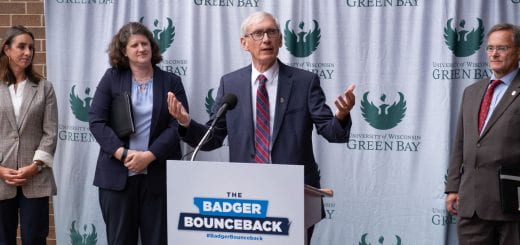UW-Green Bay students and faculty shine at WSTS
MENOMONIE—UW-Green Bay students and faculty made a big impact at WiSys’ annual celebration of research and innovation, known as WSTS, on July 22-23 at UW-Stout. Some of the UW-Green Bay highlights include:
UW-Green Bay Assistant Prof. Md Maruf Hossain received the Innovator of the Year Award.
Student Akanksha Gurtu’s poster “Sustainable Conversion of Contaminated Water into Potable Water” won third place in the annual Poster Symposium. UW-Green Bay Assistant Prof. Mandeep Bakshi is Gurtu’s faculty advisor.Poster Abstract: Magnetic nanoparticles (NPs) belong to a unique class of nanomaterials with enormous interesting applications in environmental sustainability and in health care. Iron oxide NPs are the most common and widely studied nanomaterials. They are much easier to synthesize at low cost and mainly exist as a-Fe2O3 and Fe3O4 known as hematite and magnetite, respectively. Hydrothermal synthesis is the most common route to synthesize iron oxide NPs. To achieve successful applications, NPs should exist independently in the aqueous phase to provide a maximum surface area. This can be achieved by producing “surface-active magnetic NPs” which is a relatively new class of nanomaterials with little information available in the literature. Surface activity helps the NPs to exploit their applications at immiscible interfaces such as that of the bacterium cell membrane in an aqueous medium. “Surface-active NPs” can be chemically modified to interact with the bacterium cell membrane and hence, they can be employed to remove bacterial contaminations from freshwater simply by applying the external magnetic field. The aim of the present study is to design sustainable biotechnology by using “surface-active magnetic NPs” for removing bacterial contaminations at low cost with high efficiency.
Students Carol Brehmer and Ebanie Schmidt took second place in the Innovation Showcase with their innovation “PIVOTAL.” See more.
Students Emily Lautenschlager, Jenna Bares and Thomas Mlodzik presented their idea for “Scan Shield”—a safe debit card designed specifically for the elderly.
Students Halee Behrens and Katlyn Tappy competed in the WiSys Quick Pitch State Final.
Click to advance slideshow or view the album on Flickr.
– Photos submitted by WiSys.
WiSys is a nonprofit organization that works with faculty, staff, students and alumni of the UW System to facilitate cutting-edge research programs, develop and commercialize discoveries, and foster a spirit of innovative and entrepreneurial thinking across the state.





